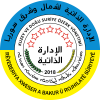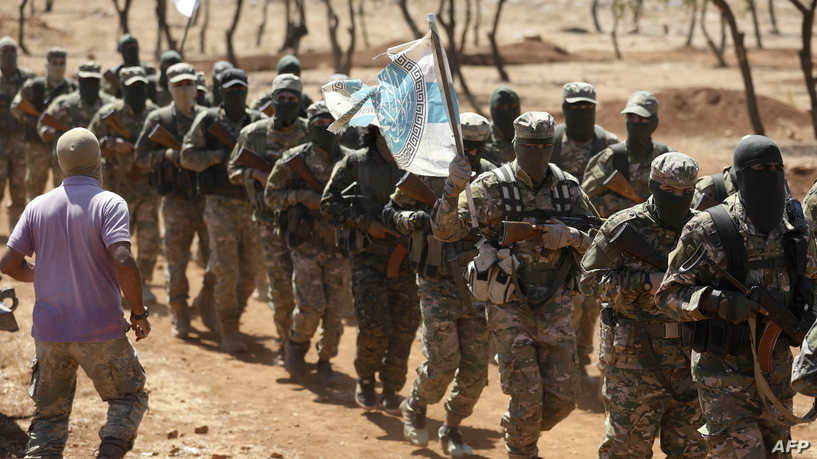The mercenaries of Tahrir al-Sham seek to change the public opinion about them, by playing with the file of foreign mercenaries in their areas of influence, in a move that Mounir Adib, a researcher specializing in extremist movements and international terrorism, attributes to the mercenaries’ intention to present itself as a moderate opposition. The countries that support it, including Turkey, stressing that there is no difference between “Tahrir al-Sham” and “Al-Qaeda”.
The mercenaries of Tahrir al-Sham (formerly Jabhat al-Nusra and classified on the list of international terrorism) have focused since the beginning of 2022 on the file of foreign mercenaries deployed in their areas of control in Idlib and its environs in northwestern Syria, as it seems that they are determined to count their numbers and deport them to other areas of the areas occupied by Turkey in Syria, in a move that raised the question of the goal and motives of this new scheme.
On February 19, the mercenaries of Tahrir al-Sham informed the foreign mercenaries in the city of Idlib to evacuate and leave their homes, as they issued a warning to more than 30 families of mercenaries of various foreign nationalities of the necessity of evacuating their rented homes or those they obtained as “spoils of war” within a maximum period of 10 days, without giving reasons.
This decision came two days after Australia included the mercenaries of “Tahrir al-Sham” and “Hurras el-Din” active in Idlib, where the Turkish occupation took control, on the list of banned terrorist organizations.
Observers believe that this step was motivated by improving the image of the mercenaries of Tahrir al-Sham, in front of world public opinion, after it was classified by many countries on the list of terrorism, and to show itself as a moderate opposition, while others consider it as pressure on foreign mercenaries who are in formations outside the squadron of “Tahrir al-Sham” mercenaries to join its ranks, leave the area it controls, or force them to implement new schemes that serve its supporters, most notably Turkey.
In the context of tightening the screws on the rival extremist groups in Idlib, the mercenaries of Tahrir al-Sham recently arrested several mercenaries and leaders of different foreign nationalities.
In mid-October 2021, they launched a large-scale military and security campaign against the mercenaries of “Jund al-Sham” led by Muslim al-Shishani, and “Jund of God” led by Abu Fatima in the areas of western Idlib, followed by violent clashes between the two parties, which ended with the control of the mercenaries of Tahrir al-Sham on the areas of Jisr al-Shughur and its surroundings, the villages of Zaytouna, Yamdiya and Jabal al-Turkman, east of Lattakia.
The dispute between the two sides comes at a time when Russia wants to neutralize the mercenaries, which it classifies as “terrorists” in the region, and Turkey’s implementation of the Moscow Agreement, which was approved on March 5, 2020, and provides for a ceasefire and the formation of a safe belt on both sides of the international road Aleppo – Latakia ( M4).
Who are the foreign mercenaries in Syria?
Waves of foreign mercenaries around the world flowed from Afghanistan to the Philippines through the Sahara Desert in the African continent to the Syrian territories to join the ranks of the mercenaries of the Turkish occupation in Idlib and its environs in northwest Syria, with the Syrian crisis turning into an armed conflict due to regional and international interventions, especially from Turkey and Qatar are the two largest supporters of mercenary groups.
The foreign mercenaries are classified into two categories, the first: the mercenaries who were dismantled by the mercenaries of Tahrir al-Sham during the past two years, including the “Hurras el-Din” affiliated with al-Qaeda, and these are divided into two parts. The first includes the militants, and these constitute a small percentage of the total number of mercenaries, and the mercenaries of Tahrir al-Sham, despite the arrest of large numbers of them. As for the second section, they are the independent foreign mercenaries, most of whom work in the so-called “da’wa field”, and among them are former defectors from the mercenaries of Tahrir al-Sham.
Analysts are likely that this category will most likely be expelled to the countryside to pressure them and force them to work for the mercenaries of Tahrir al-Sham, and that these are supposed to be a prominent target for Tahrir al-Sham’s first steps in its new policy of dealing with the file of foreign mercenaries.
The second group: They are the mercenaries who work for the mercenaries of Tahrir al-Sham and are considered part of its organizational, military and security structure. This classification includes the mercenaries of “Ansar al-Din Front”, “Turkistan Islamic Party”, “Salah al-Din al-Kurdi” group, “Uzbeks” and other mercenaries, that analyzes suggested that they will be dealt with with special efforts in the later stages, and will often be in the framework of their integration into the local community.
mapping..
In this regard, Mounir Adib, a researcher in the affairs of extremist movements and international terrorism, attributes the motives for obliging the mercenaries of Tahrir al-Sham, the foreign mercenaries living in Idlib, to evacuate and leave their homes, to the map drawn by the countries supporting these mercenaries to implement their plans, saying: “Hayat Tahrir al-Sham (the Front for the Liberation of Al-Sham) Al-Nusra (formerly) has positions in northwest Syria and coordination is carried out between it and the Turkish and American sides, a body supported by some countries, most notably Turkey. I think that the United States of America is also satisfied with it and supports it, and this support may push these countries to draw a map.
He continued: “The map of the work of this body, its groups and places of concentration, and therefore if military action is needed in an area, ask Hay’at Tahrir al-Sham to move to it or send soldiers and fighters affiliated with it. Therefore, I think that the idea of evacuating homes is related to the form and nature of the existence of the movement and military operations that the countries that support it, including Turkey, are planning.
He believes that the destination to which the foreign mercenaries will be transferred may be northern and eastern Syria or areas inside Syria, and he went on to say: “But in the end it remains that the deportation of these is related to the form and nature of the military operations of this movement that are operated or supported by countries in its surroundings, including Turkey, and therefore Turkey, when it moves to confront its enemies, uses these arms or these militias that pay the salaries of its fighters and support them in another way.”
Get out of the mantle of terrorism
In addition, Abu Muhammad al-Julani, the commander-in-chief of Tahrir al-Sham’s mercenaries, appeared more than once in public and in civilian clothes, in a move that observers interpreted as falling within the framework of his efforts to devote himself as a moderate figure, sponsoring civilian activities to serve the population, away from the terrorist classifications marked by his group by the Security Council, the United States and some other countries.
Adeeb explains that Al-Julani’s goal in appearing in a civilian appearance is only to improve the image of Tahrir al-Sham’s mercenaries in front of public opinion and citizens in the areas under his influence, and that it is an attempt to reproduce his mercenaries. Al-Nusra belongs to Hay’at Tahrir al-Sham, but it remains an extremist organization and an organization that has been placed on the terrorist list because of its relationship with Al-Qaeda and ISIS, and even if it has no connection with both organizations, it is not much different from Al-Qaeda Jihad and not a moderate organization.”
And the mercenaries of Tahrir al-Sham had previously tried to make it clear to the public that they had disengaged from al-Qaeda and other terrorist organizations after the Security Council and the United States of America included them on the list of terrorism, as they changed their name from Jabhat al-Nusra to Jabhat Fateh al-Sham in 2016. It was called “Hay’at Tahrir al-Sham” in 2017, after other Syrian mercenary groups joined it.
In 2012, the United States of America included Jabhat al-Nusra, currently called “Tahrir al-Sham” on the list of terrorist organizations, and the Security Council approved this designation six months later, while Turkey, the largest supporter of Jabhat al-Nusra, agreed to classify it as a terrorist organization in 2018, despite its continued support, this is evidenced by the presence of these mercenaries in the areas it occupies in Idlib.
international pressure paper
On whether this move by the mercenaries of Tahrir al-Sham stems from an international scheme or a Turkish-Russian agreement to empty the area and hand it over to the Damascus government, Adeeb says, “There is no information about the idea of evacuating this area or whether there is a Russian-Turkish consensus regarding handing over this area belongs to Damascus or the Syrian regime, but in the end it remains that there is an international use, whether by Russia or even Turkey, of extremist organizations and Hay’at Tahrir al-Sham.”
He added: “If there is a Russian-Turkish consensus regarding handing over this area to Damascus or the Syrian regime, then this means that Turkey was and still has a relationship with Hay’at Tahrir al-Sham, and it also means that there is a relationship between these mercenaries and the Damascus government, and this is a matter of great concern and concern. about reusing these extremists in another region, or establishing new relations with them, and giving them roles they might play to complete their sabotage acts.”
In conclusion, the researcher in the affairs of extremist movements and international terrorism, Munir Adib, stressed that the mercenaries of Tahrir al-Sham do not differ much from extremist organizations that cross borders and continents, and they are the most powerful strategies in the hands of their supporters (Turkey and the United States of America), to use them in the face of their enemies, and said: “The United States seeks to use them in confronting the Syrian regime, Russia’s strategic ally, and also confronting Russia, which has established a military base in Syria and the Middle East, and at the same time Turkey uses these organizations for its own goals. These countries have no objection to putting their hand in the hands of Satan if The goal or the price was to achieve its political interests.”

